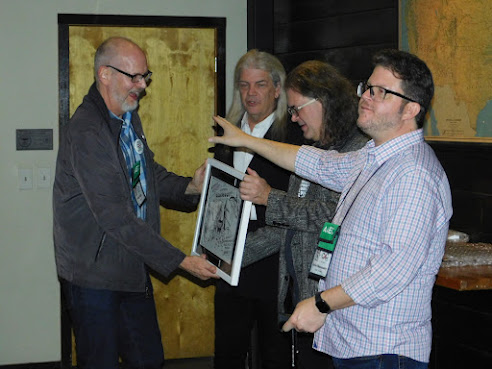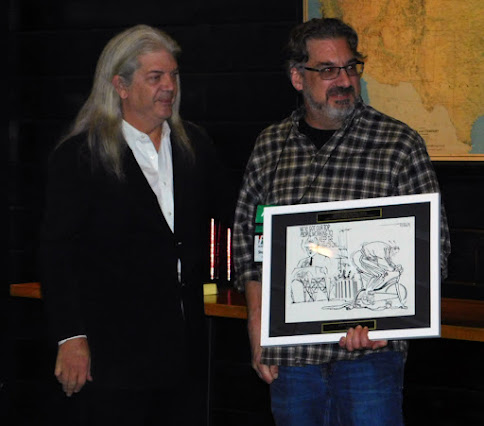Happy All Hallow Steve, everybody!
Monday, October 31, 2022
This Week's Sneak Peek
Happy All Hallow Steve, everybody!
Saturday, October 29, 2022
You Say You Want a Free Election? Well, You Know
There's still just over a whole week of those ghastly campaign commercials bombarding us on the TV, radio, social media, YouTube, and front yards. So let's take a break from Election 2022...
 |
| in UW-Parkside Ranger, Oct. 21, 1982 |
...but first, this commercial from Election 1982.
Scott McCallum was running in Wisconsin for the senate seat held by William Proxmire, and aired a TV ad arguing that he was sympathetic to voters suffering from the Reagan recession and offering his unemployed brother John as proof.
McCallum's ad didn't work, even though Proxmire didn't campaign on television at all. I suppose Wisconsin voters actually rewarded Proxmire for that.
 |
| in UW-Parkside Ranger, Oct. 28, 1982 |
Pete Jansson was the Republican running against my district's congressman, Democrat Les Aspin. At a candidate forum hosted by the University of Wisconsin - Parkside, Jansson campaigned against what he called "Aspinomics." I suppose that was an applause line in any GOP crowd, but it fell flat in the mixed audience on a university campus.
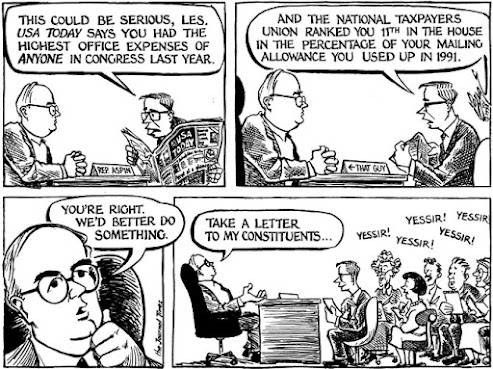 |
| in Racine Journal Times, Oct. 7, 1992 |
1982 was the Democrats' year, and Les Aspin cruised to a seventh term. By 1992, he was firmly ensconced as the First District's Congressman, Chair of the House Armed Service Committee, and running for his twelfth.
 |
| in Racine Journal Times, Oct. 20, 1992 |
Senator Robert Kasten (R-WI) came to office in the Republican sweep of 1980 and survived the Democratic wave of 1986, but sailed into strong headwinds in 1992. He painted his Democratic rival, Russ Feingold, as a dangerous radical — which is the standard Republican tactic — but then likened his own positions to those of Wisconsin's Junior Senator, Democrat Herb Kohl, and, incredibly, the Democrats' presidential candidate.
It is impossible to imagine any Republican since then offering themselves up as Almost Like Bill Clinton, or any other Democrat. Since the rise of Newt Gingrich in 1994, any hint of bipartisanship has become anathema in the GOP.
 |
| in UW-Milwaukee Post, Oct. 29, 1992 |
Then there was the ad Feingold filmed greeting voters at The Joke Shop in Waukesha. The owner of the store, Jeffrey Campbell appeared in the ad, saying "Yes, it is," in response to Feingold asking "Is this a joke shop?"
Campbell was so upset afterward that Feingold's ad made him appear to support the Democratic candidate that he got himself into a Kasten ad swearing his loyalty to the Republican incumbent. Kasten's ad culminates with its narrator asking, "If we can't trust Russ Feingold's ads, can we trust Russ Feingold on crime, welfare reform or taxes?"
Jump we now to 2002: Drawing for a national LGBTQ+ audience, I only find an excuse to cartoon about local political races when there is a queer angle to one. My one such opportunity in October of 2002 came with the contest in Montana for the U.S. Senate seat held by Democrat Max Baucus.
This time, it was the Democrats running a homophobic television spot.
 |
| for Q Syndicate, October, 2002 |
Challengers have one advantage in these ads in that they can pick and choose any one vote by the incumbent, even on a procedural matter, to accuse the incumbent of being against something that sounds popular or for something that can be given an unpleasant nickname. Republican Mike Taylor didn't have a voting record for Sen. Baucus to comb through, but someone at the Democratic Senatorial Campaign Committee dug up video of Taylor when he owned a cosmetology shop in Denver about ten or so years earlier.
The ad (paid for by the DSCC, not the Baucus campaign) accused Taylor of embezzling funds from the shop. The visual of Taylor massaging a male customer's face insinuated that Taylor might be gay. Whether it was due to the allegation or the insinuation, it was enough to prod a weepy Taylor to withdraw from the race at the 11th hour.
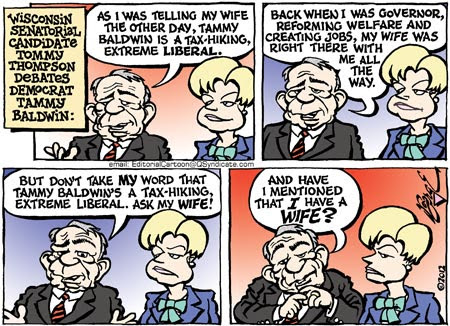 |
| for Q Syndicate, October, 2012 |
Come 2012, I seized the opportunity to return to Wisconsin politics in my syndicated cartoon when former Governor Tommy Thompson challenged incumbent Senator Tammy Baldwin in a televised debate. While he didn't engage in any overt anti-LGBTQ+ rhetoric against the only openly lesbian Senator at the time, he did seem to make an unusual number of references to Mrs. Tommy Thompson.
I've found Senator Baldwin's a challenging face to draw, and I tried to make this caricature as simplified as possible. In the end, I don't think this approach worked, and I haven't used it since.
✍
That brings us up to the present, so that's it for today's installment of congressional campaign cartoons past. We now return you to your regularly scheduled campaign commercials.
Thursday, October 27, 2022
Q Toon: A Hallowe'en Classic
This week's cartoon goes out especially to my readers in Philadelphia Gay News, where the Republican candidate for governor thinks a local hospital is abducting homeless children to practice gender reassignment surgery on them. (I'm not making this up. He is.)
It was the latest in a series of extreme and false statements by Doug Mastriano, who made the comments during an interview with a right-wing network that features Steve Bannon and a steady stream QAnon conspiracies. ...
During a program this week the host of a program on the “Real America’s Voice” network asked Mastriano a loaded question about his Democratic opponent in the gubernatorial race, Josh Shapiro, who is Pennsylvania’s Attorney General. Mastriano then took the opportunity to falsely claim: “He’s standing aside while the Children’s Hospital of Philadelphia is grabbing homeless kids and kids in foster care, apparently, and experimenting on them with gender transitioning, something that’s irreversible.”Mr. Mastriano is not alone in fabricating false facts, of course. The Republicans' senatorial candidate in Georgia, football star Herschel Walker has become a laughingstock around the country for claiming that he's an FBI agent-cum-police special consultant who graduated valedictorian from the University of Georgia (no, he didn’t graduate at all) and started a breaded-chicken empire nobody else has ever heard of. Not to mention his denying the stray children and abortions he happens to be responsible for.
Even his own campaign staffers admit that Walker is a serial liar.
And yet he stands an even or better chance of being Georgia's next senator.
The GQP candidate for governor in Arizona, Kari Lake, clings ferociously to the lie that some nefarious conspiracy stole the 2020 election from Donald Trump. Retrumplicans in her state tried over and over and over again to find evidence of massive voter fraud, only to come up with a greater Biden win in Arizona than in the original vote count.
If she is elected governor, she promises to add new restrictions on Arizonans' right to vote: only on Election Day, at a polling place, on paper (counted only by hand), and with voter identification on all ballots. That's right: no more secret ballot. And if she still doesn't like how the people vote, she'll simply refuse to certify the results.
And she has a five-point lead in the polls.
Here in Wisconsin, voters have already elected Ron Johnson to two craptastic terms in the U.S. Senate and may very well give him a third, in spite of his pretending that the January 6 insurrectionists were unarmed and peaceful, that mouthwash was as good or better at protecting against COVID-19 as the actual vaccines, and that Dr. Fauci had "overhyped" both COVID-19 and HIV-AIDS.
On January 6, 2021, Johnson sent lists of fraudulent electors to Vice President Mike Pence on the Senate floor in an effort to overturn the wills of Wisconsin — and Michigan — voters. Happily, Pence's staffer told Johnson's errand boy to get lost. Johnson's excuse once the episode came to light was that somebody, he doesn't know who, wanted something, he didn't know what, delivered to Pence that day, so he said, sure, whatever, what does it matter?
The list of these Republicans goes on and so forth, et cetera ad infinitum, with one after another running to be governor, secretary of state, attorney general, senator, congressperson, judge, district attorney, sheriff, school board member, and deputy assistant ombudsman of the water department from coast to coast — many of them firmly convinced that public schools are providing litter boxes for students who believe they are cats.
It's times like these when you wish the phrase "most important election in our lifetime" hadn't been used to describe every election in our lifetime.
Wednesday, October 26, 2022
Remembering Ash Carter
Ash Carter, Secretary of Defense in the last two years of the Obama administration, succumbed yesterday to a heart attack. I only ever drew him in one cartoon, and this is it.
Monday, October 24, 2022
Saturday, October 22, 2022
Big Al's Sports Report (Love That Tinkle!)
In honor of the World Series, in which no other country in the world has been invited to play, Sliderback Saturday winds up and pitches some cartoons from the even more exclusive World Series of 1922.
 |
| "The Fan" by Clifford Berryman in Washington (DC) Evening Star, Oct. 4, 1922 |
Not only was the 1922 World Series limited to teams from one country, it was limited to teams from just one city. The series pitted the New York Giants against the New York Yankees, so you might suppose that the rest of the country would have lost all interest in what had become a strictly New York affair.
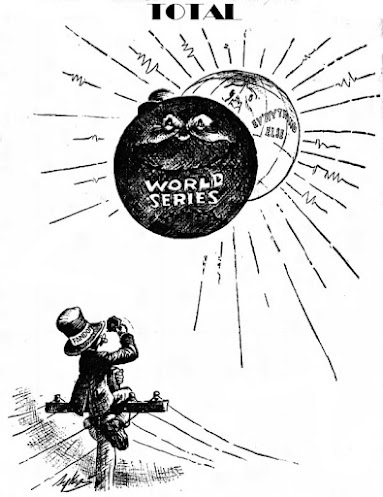 |
| "Total" by Bill Sykes in Philadelphia Evening Ledger, Oct. 4, 1922 |
But that wouldn't sell papers, would it?
 |
| "The Ball Weevils" by John Knott in Galveston Daily News, Oct. 8, 1922 |
If any interest in the series fell off in the rest of the country, there were still enough fans of the game, or at least gambling on it, to warrant this cautionary cartoon out of Dallas.
Any gamblers who bet on the Yankees were shut out of luck: the New York Baseball Giants swept them four games to none. (There were five games in this subway series; Game 2 ended in a 3-3 tie after ten innings.)
 |
| "Hats Off to M'Graw" by Bud Counihan in New York Evening World, Oct. 9, 1922 |
One newspaper job that disappeared decades ago was that of the sports cartoonist. Major newspapers like the New York Evening World might even have more than one on staff.
Here Bud Counihan salutes the winning coach, John J. McGraw and illustrates highlights of the final game of the series for the benefit of those who might have only read about the games the next day in the paper, if they didn't happen to have access to one of them new-fangled radio thingamabobs.
 |
| "Oh, the Melancholy Days" by John Knott in Galveston Daily News, Oct. ,4 1922 |
Fortunately for fans then and now, if one's baseball team falls by the wayside short of the World Series, one can always turn to football. It's the start of the gridiron season, and anything is still possible.
 |
| "Impressions of the Pitt-Bucknell Football Game" by Bertin F. Link in Pittsburgh Press, Oct. 29, 1922 |
Judging by the sports cartoonists of the day, there were more fans of college-level football than of the professional variety. The newly-named National Football League consisted of sixteen teams, only two of which remain with us today: the Decatur Staleys (now the Chicago Bears) and Racine/Chicago (now Arizona) Cardinals.
 |
| "A Tragedy of the Football Field" by John T. McCutcheon in Chicago Tribune, Oct. 29, 1922 |
One thing that has changed has been efforts to protect football players from serious injury. You'll notice in these cartoons that the football players' helmets are nothing more than leather caps. They have no mouth guard (although by the 1920's, some players were improvising attempts at creating them); disfiguring facial injuries were commonplace. Concussions were expected and accepted.
This may seem difficult to believe, but in football, there was more of a priority in protecting the player’s upper body, than in head protection. The invention of football shoulder pads was by L.P. Smock, who was a student a Princeton. His 1877 design were made of wool and leather and were actually stitched onto the player’s jersey. After the turn of the century, we see the development of the ‘harnessed’ shoulder pads that are over the head and attached via the chest area. While an improvement in design, they continued to be made of a combination of canvas and leather. It wasn’t until the 1960’s and 70’s that plastic shoulder pads appeared. By the 1990’s we saw the advent of the bulky padding that our players today wear.
 |
| "Speaking of Fullbacks" by Woodson M. Cowan for George Matthew Adams Syndicate, ca. Oct. 13, 1922 |
Scientist: "The X-ray shows your skull to be exceedingly thick."
Text: "Scientist discovered that his dome is especially constructed for use as battling ram to hit the line with."
As pointed out elsewhere in the cartoon, Locke was no simple-minded bonehead. He would graduate third in his class at the University of Iowa College of Law, graduating in the top three of his law school class. After coaching football at U of I and Western Reserve University, he was general assistant law director for the city of Cleveland, then general counsel in Washington D.C. for the Committee for Oil Pipe Lines.
Sticking with football for one more cartoon, I'll note here that off the playing field, striking coal miners had reached agreements with mine owners and gone back to work. But then as now, supply chain issues meant that cold weather was moving in before adequate supplies of coal to heat everyone's homes and businesses. What supplies there were fetched premium prices.
 |
| "Neighborhood News" by Fontaine Fox for Wheeler Syndicate, Oct. 28, 1922 |
Then as now, it was surely all Joe Biden's fault.
Thursday, October 20, 2022
Q Toon: Count On It
It's hard to tell what the Republican Party stands for any more.
Other than coming to power By Any Means Necessary, that is.
The party that impeached a president over a blow job wasn't in the least bothered by a president who attempted to overthrow the government by force. And they're just fine with a senate candidate who fathered and abandoned a bunch of children with various girlfriends, and paid for at least one abortion, which I used to think was the GOP's biggest no-no.
Paying for things, that is.
Every time there's a mass shooting somewhere, the GOP wails that it's too soon to talk about even the slightest, weakest gun control legislation. Turns out that the time to talk about crime is in the three months before a general election, during commercial breaks when you're trying to watch Jeopardy! or Dancing with the Stars.
There is a long list of things that Republicans are against, of course. They hate transgender children, gays, lesbians, admitting that centuries of oppression against peoples of color has any lasting effect, cities, public schools, protecting any corner of the environment that isn't a golf course, science, health care, other people's religion or lack thereof, and on and on.
And now they are against counting the votes of people who manage to vote for Democrats in spite of Republicans' decades-long efforts to prevent them from voting in the first place.
Sure, there are still some Republicans who still believe in democracy. But their days are numbered thanks to all the RINO hunters in their ruby-red districts who don't.
Here in Wisconsin, the voting laws and the Elections Commission were created by the Republican legislature and signed into effect by Republican Governor Scott Walker in 2015. Republicans had no complaints when Donald Berzelius Trump won the state the next year, or in the off-year elections of 2017, 2018, and 2019. (Okay, they weren't happy with Democrat Tony Evers winning the governorship, but they used their majority in the legislature to strip the governorship of most of its powers before he could take office.)
When the majority of Wisconsin voters voted for Joe Biden, suddenly Republicans wanted to overrule the voice of the people and declare Trump the winner anyway. Governor Evers's vetoes have been the only thing stopping them from disbanding the bipartisan Elections Commission and replacing it with one that will have a Republican majority as long as Republicans remain in charge of the redistricting process. And being in charge of the redistricting process enables them to remain in charge of the redistricting process forever.
Republican billionaires are outspending Democrats and liberal interest groups in advertising aimed at replacing Governor Evers and Attorney General Josh Kaul with conspiracy-mongering election deniers, and in achieving a veto-proof GOP majority in the legislature. (Judging from the disappearance of the TV ads against transgender Democrat Jessica Katzenmeyer running for State Senate, they may believe that their goal has been met; 2022 redistricting made the 15th district more heavily Republican anyway.)
Elsewhere in the country, the arsonists are already in charge of the fire department. Florida Governor Ron DeSantis sent his Gestapo The Vote squad into the inner cities to arrest felons — almost all of them Black by some strange coincidence — who had served their time and mistakenly thought they had regained the voting rights of ordinary citizens. Whether he'll dump them back into prison or fly them to Martha's Vineyard remains to be seen.
Whether he'll get around to rounding up similar felons in Republican districts also remains to be seen. I'm sure there are plenty of right-wingers on the registered sexual offender list in the Florida panhandle, and some of them tried to vote in 2020, but don't hold your breath waiting for the DeSantis goons showing up at their mobile homes.
In all, 291 Republican candidates for Congress, governorships, secretaries of state, attorneys general, and other constitutional offices around the country continue to cast aspersions against the will of the people in the 2020 elections.
Some may even have been supported by idiot Democrats who thought they'd be easier to beat in the fall. But over half of them are expected to win election to office.
There are far too many win-at-any-cost right-wing stooges who would vote for Elagabalus if he ran as a Republican.
Tuesday, October 18, 2022
Toon: Tim Michels
During the primaries, Tim Michels, the Trumplican gubernatorial candidate in Wisconsin, told right-wing radio audiences that the state's antebellum anti-abortion law is an "exact mirror of my position." The 1849 law, which went back into effect when the Alito-Thomas Court overturned Roe v. Wade this year, makes abortion a crime in practically all circumstances, including cases of rape, incest, or a danger to the woman's health.
Even after the August primary, he told a Dane County Republican audience that he would not soften his anti-abortion stance to allow for exceptions for rape and incest cases.
Since then, he has allowed for the possibility that he would sign a bill that would allow rape and incest victims to terminate a resulting pregnancy, in the event that our legislature with its entrenched Republican majority were to send him such a bill.
Given, however, that our Republican state legislature summarily adjourned within seconds the special session Governor Evers had called on the abortion issue, only a fool would hold out hope that they would send a Governor Michels that bill.
Monday, October 17, 2022
This Week's Sneak Peek
By the way: I had mentioned a while back that I had received July and August issues of Wisconsin Independent, but not a September issue by the end of the month. Wisconsin Independent is a twelve-page newspaper that appears to be campaign literature but doesn't include a disclaimer to that effect.
Well, the September and October issues arrived in the mail in the past two weeks, with headlines including "Wisconsinites Stand to Benefit from Student Debt Relief" (byline Armand Jackson, Northern Wisconsin Times) and "Ron Johnson Campaign Employs Fraudulent Elector" (byline Josh Israel).
With the election on November 8, the latest possible date, there's plenty of time for them to get a November issue out.
But with no paid advertising in it, the prospects of a December issue are slim to none at best.
Saturday, October 15, 2022
Epitaph for R. C. Bowman
I wrapped up my post the other day about this year's AAEC convention by mentioning that I used the occasion to donate a 121-year-old book of editorial cartoons to the Billy Ireland Cartoon Library and Museum.
 |
| The cover of R.C. Bowman's book |
Okay, it's not on the same level as Monte Wolverton donating a busload of his father's cartoon work to the BICL&M, but my Dad isn't a cartoonist. Although he was in a Vaughn Shoemaker cartoon once and has the original hanging in his office.
Outside of my own blog posts about the book, there isn't much on line about turn-of-the-century Minneapolis Tribune editorial cartoonist Rowland C. Bowman. Part of the reason for that is that he died quite young, overpowered by gas fumes at his home.
 |
| Report in Culver (IN) Citizen, June 4, 1903 |
Which is not to say that Bowman was either obscure or quickly forgotten. The Strand magazine was very impressed with him (and with Minneapolis Journal cartoonist Charles "Bart" Bartholomew) in a 1902 article about U.S. editorial cartoonists. And Syd Hoff included a pair of Bowman cartoons in his 1976 tome Editorial and Political Cartooning: From Earliest Times to the Present With Over 700 Examples from the Works of the World's Greatest Cartoonists.
 |
| "Royal Leap Frog" by R.C. Bowman in Minneapolis Tribune, May 30, 1903 |
Bowman's last editorial cartoon in the Minneapolis Tribune appeared on Saturday, May 30, 1903. Starting on Sunday, May 31, the Tribune began running cartoons by C.F. Naughton in Bowman's front-page spot.
 |
| "And When They Grow Up, They Would Not Put Away Childish Things" by C.F. Naughton in Minneapolis Tribune, May 31, 1903 |
Long-time followers of these Saturday history posts may remember that Naughton was editorial cartoonist at the Duluth Evening Herald in the 19-teens.
If any readers of the Minneapolis Tribune spotted that Bowman had been replaced at the bottom of Page One, they found the explanation on the bottom of Page Eight. I'll be charitable and attribute the Tribune's misspelling his name to the news room's collective grief.
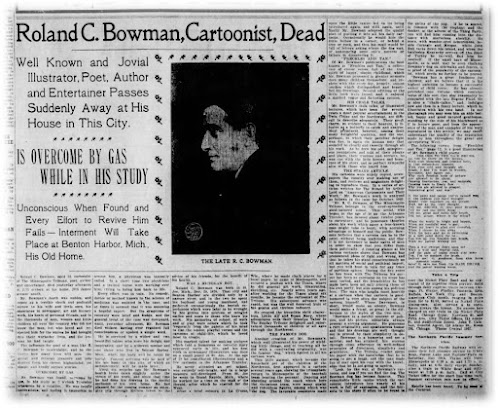 |
| in Minneapolis Tribune, May 31, 1903 |
The remainder of today's post is the text verbatim of the Minneapolis Tribune article reporting Bowman's death. The Strand piece, which it quotes extensively, mentions cartoons accompanying it. The cartoons interspersed with my transcription of the Tribune's report are from Bowman's 1901 book, not the 1902 Strand article.
 |
| "Don't You Want to Buy a Dog" |
Roland [sic] C. Bowman, aged 32, cartoonist at The Minneapolis Tribune, poet, author, and entertainer, died yesterday at his home, 2016 James avenue south.
Mr. Bowman's death was sudden, and comes as a terrible shock and profound sorrow to his wife and little ones, his associates in newspaper, art, and literary work, his hosts of personal friends, and to the thousands of men, women, and children all over the country who did not know the man, but loved and respected him for the smiles he had brought into their workaday lives, and the lessons he had taught.
The influence for good of a man like R.C. Bowman is incalculable, and no one knows how many lives will miss the genial and rational pleasure and help derived from his clever, highminded, yet simple and kindly picture stories.
OVERCOME BY GAS
Mr. Bowman was found overcome by gas in his study at 2 o'clock Thursday afternoon by a relative. He was totally unconscious, and finding it impossible to arouse him, a physician was instantly called. In a short time two physicians and a trained nurse were working over him trying to bring him back to life.
Every effort was in vain. No remedy, device, or method known to the science of medicine was omitted in the case, and at times it seemed that it was assuming a hopeful aspect. But the symptoms of recovery were brief and feeble, and the general trend of the case was downward, until, yesterday afternoon, Mr. Bowman died without ever having regained full consciousness or spoken a single word.
He is survived by a widow and two beautiful babies, who were his delight and inspiration, and by a widowed mother and one sister who live in Benton Harbor, Mich., where his body will be taken for burial. Funeral services will be held at his late home in this city, of which an announcement will be made later.
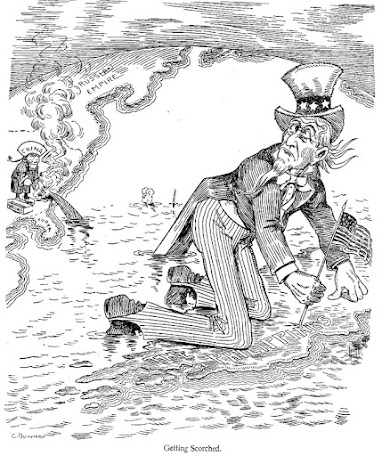 |
| "Getting Scorched" |
About six months ago, Mr. Bowman's health broke down slightly under the strain of his work, and since that time he had done his drawing in the restful seclusion of his own home. He had planned for the coming summer an extensive trip through Europe, taken by the advice of his friends for the benefit of his health.
WAS A MICHIGAN BOY
Roland C. Bowman was born in St. Joe, Mich. December 29, 1870. That city and Benton Harbor are divided only by a narrow river, and in the two he spent his boyhood and young manhood, and gathered unconsciously the boyish experiences which were later to be wrought by his genius into sources of mingled smiles and tears to those who knew his work. His memories of school, of work, and of play were colors which he took frequently from the palette of his mind to tint the tender, playful verses and the cartoons of child-life, which he loved most to create.
His marked talent for making pictures which told a humorous or forceful story appeared early in life, and his first work in newspaper illustration was done on a small newspaper in St. Joe. At the age of 19 he contributed illustrations and a few cartoons to the Arkansas Traveler.
 |
| "Not Worth Landing" |
He never attended an art school, was entirely self-taught, and in a large measure self-developed. From St. Joe he went to Grand Rapids, Mich., where he worked for a time on the staff of the Herald, after which he started for the West.
After a brief sojourn in La Crosse, Wis., where he made chalk plates for a local paper, he came to Minneapolis, and secured a position with the Times, where he did general art work, illustrating, sketching, etc. Nearly seven years ago, after working with the Times six months, he became the cartoonist of the Tribune. His subsequent advance was rapid, but was the well deserved fruit of his genius and tireless industry.
 |
| "Rah! Rah! Rah" |
He created the irresistible child characters Little Alf and Susan Mary, whose adventures with their Grandpa Tabor in the Sunday Tribune delighted and entertained thousands of children of all ages through the Northwest.
THE FAMOUS DOG
Another creation of Mr. Bowman's, which well illustrated his power of wielding little things, and of touching all he did with a captivating originality, was the famous "dog," which figured in all his cartoon work.
This little animal, which became the household pet of the children of the Northwest, first appeared in a cartoon several years ago, showing the triumphant return to Minneapolis of the baseball team bearing the pennant. Dancing and shouting around the coach which bore the triumphant team, were many quaint and ridiculous figures, among which was the dog. The favorable comments made upon the little canine led to its being introduced again, and still again, until finally Mr. Bowman adopted the quaint plan of putting it into all of his daily cartoons. Occasionally, he would hide the little fellow in a corner, or behind a tree or rock, and then his mail would be full of letters asking where the dog was, or announcing someone's success or failure in discovering it.
 |
| "The Run-Away Bill" |
"FRECKLES AND TAN"
Of Mr. Bowman's publications the best known is "Freckles and Tan," a collection of clever verses, full of the true spirit of happy simple childhood, which Mr. Bowman possessed in greater measure than many children themselves; and replete with the every day, homely human touches which distinguished and beautified his drawings. Several editions of the little book were issued, and it enjoyed a marked vogue and flattering success.
HIS CHALK TALKS
Mr. Bowman's chalk talks, or illustrated lectures, which have been for several years a most popular entertainment in the Twin Cities and the Northwest, are difficult to describe adequately. Their great charm, so evident to their hearers, is illusive as a butterfly to catch and analyze. Most prominent, however, among their many delightful qualities, and the one, perhaps, to which their peculiar delight was due, is again the human note which sounded so clearly and sweetly through all his work. As he drew his odd, mischievous youngsters, and told of their pranks and plays, their troubles and sorrows, he was one with the little heroes and heroines of his story, and in perfect sympathy also with those who heard him.
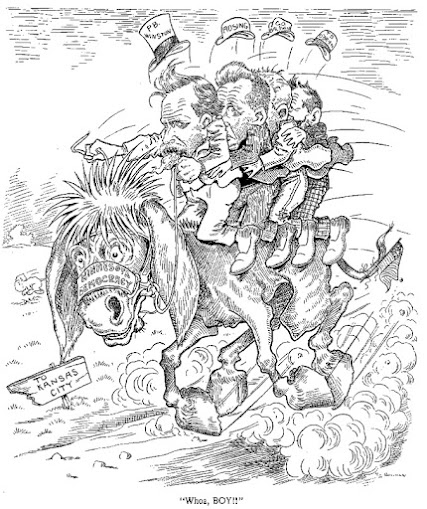 |
| "Whoa, Boy" |
THE STRAND ARTICLE
His cartoons were widely copied, newspapers the country over making use of them, and reviews and magazines delighting to reproduce them. In a series of articles written for The Strand by Arthur Lord on "American Cartoonists and Their Work," Mr. Bowman's work is analyzed as follows in the issue for October, 1902:
"Mr. R.C. Bowman, of The Minneapolis Tribune, belongs to the ever-spreading good-natured school. This artist, who began at the age of 19 on the Arkansas Traveler, has devoted about twelve years to the art of caricature, and he possesses theories about his work which many a less-known man might take to heart, with accruing advantage to himself and the public. Bowman believes that a cartoon can be to the point without being malicious, and that it is not necessary to make ogres of men in order to show that you differ with them politically. A running glance at his various cartoons shows that Mr. Bowman has pronounced ideas of right and wrong, and that he takes his stand conscientiously on all matters of social and political import, but you will hunt in vain for any trace of partisan spleen. During the five years that he has been with the Tribune his output has been as enormous as its scope has been varied, and the friendships he has made have been not only among those of his own party, but also among his political foes. The man who laughs most heartily at a cartoon when that cartoon is good-humored is very often the subject of the cartoon himself. Where Davenport, in short, would make an enemy, Bowman would make a friend, so great is the difference in the styles of the two men.
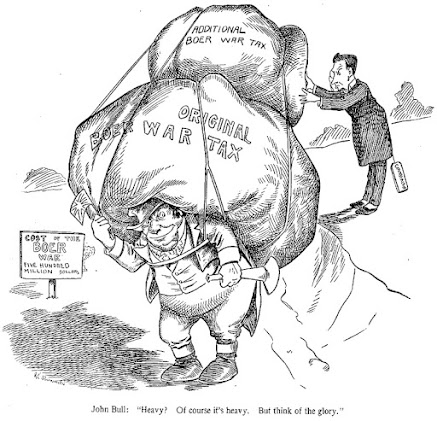 |
| "Of Course It's Heavy. But Think of the Glory" |
"Bowman is a careful student of politics, and his picture editorials always present a strong argument. He possesses a rare originality, and spontaneous humor and that his drawings are well thought out is proved by their simplicity in detail. Bowman is a humorist and not a satirist, and has attained his success through adherence to well-defined principles of directness, simplicity and gentleness. The Tribune reader opens his paper with the knowledge that he is not going to squirm.
"Look, by the way, at Bowman's cartoons, and see if you can find the dog. The Bowman dog has become famous. This remarkable little canine which the cartoonist introduces into nearly all of his work is full of expression and the keynote of the story [is] often found in the antics of the pup. If he is scared, in common with the elephant and the donkey, at the advent of the Third Party, you will find him running into the distance with marvelous alacrity. He rests, with wonder-eyed demureness, beside Carnegie and Morgan, while John Bull tacks down his island, and when the battleship Kentucky arrives off the coast of Turkey, he is — well, find him for yourself. If the small boys of Minneapolis, as is said, may be found chalking Bowman's dog on sidewalks and fences, it is proof of the popularity of the cartoonist, which needs no further to be proved.
 |
| "The Meanderings of Willie and Little Steve" (from a series) |
"Bowman has a great fondness for children, and we believe that it is his highest ambition to become a successful writer of child's verse. He has already published one volume which contains verse of this sort that may reasonably be compared with the late Eugene Field. He is also a "chalk talker" and indulges now and then in a funny lecture, which he illustrates with his own hand. In our photograph you may [see in] him an able bodied, happy and good natured gentleman, standing by the side of his blackboard as if in lecture pose, and from the appearance of the man and examples of his work we may easily understand the quality of the reputation made by him throughout the great and enterprising West."
 |
| "It Turns Out to Be a Hornet's Nest" |
The following verses from "Freckles and Tan," page 12, is a good illustration of Mr. Bowman's child poems.
THE ODE TO THE HAIR BRUSH
 |
| "Mandy, Pass Up Here and Let Me Give You Another Slice of the Paramount Issue" |
Thursday, October 13, 2022
Q Toon: Wink, Wink, Nudge, Nudge, and ... Action!
It's common for some little kids to want to grow up to be movie or TV stars. Those with an artistic bent might dream of creating the set design, mattes or special effects, or perhaps the costumes. Budding musicians may look forward to composing film scores someday.
But if you've ever sat after the movie waiting for that Motion Picture Association of America logo to float up the screen, you know that there are a whole host of people working behind the scenes in jobs you've never heard of. Do kids fantasize about becoming a gaffer or key grip someday? Or is landing the job of best boy something adults strive for in a desperate effort to cling to their childhood?
Frankly, I have no idea what qualification one needs to become an intimacy coordinator.
They're the people responsible for making actors comfortable on set when called on to film a sex scene (or, I suppose, any nude scene whether it's a sex scene or not). All those gaffers, grips, best boys and girls, set dressing drivers, assistant location managers, assistant hair department heads, craft servicemen, and traffic captains are ushered off the set (presumably by the executive set usher and assistant), and the intimacy coordinator gets to work coordinating the intimacy.
The intimacy coordinator is responsible for making the actors comfortable getting naked in front of the director, camera man, and whatever the name of the job of the person with the clapboard is, then pretending to have sex with each other. That's even if the sex in the film wouldn't be comfortable in real life: perhaps it's not supposed to be consensual, or it takes place on a burning tugboat off the coast of North Korea.
Someday, the young man in this cartoon is going to run into someone who is interested in learning more about his career aspirations. Are there college courses to prepare you to be an intimacy coordinator? Or is that something you pick up on the street? What does a producer want to see on your résumé? Is there on-the-job training? Do you get your start off-Broadway?
And what do you say after long hours of coordinating a whole bunch of intimacy and you go home and over dinner your significant other asks, "So how was your day?"
Wednesday, October 12, 2022
AAEC: Do Awards Smatter?
The Association of American Editorial Cartoonists convened in Columbus, Ohio, last week, and I was there for all the hullaballoo and excitement. (I had to be. I'm on the board.) We gathered at watering hole Village Idiot to mourn the passing of the Pulitzer Prize Award for Editorial Cartooning, unceremoniously dropped by the Pulitzer People last year rather than selecting among the three fine finalists they were offered.
So naturally, one of the big questions asked at the convention was: Do Awards Matter? — the topic of a panel discussion with cartoonists Lalo Alcaraz (one of those fine finalists), Signe Wilkinson (a past awards judge), Clay Jones (this year's RFK Awardee), and moderator Kevin "KAL" Kallaugher.
Whether awards matter or not didn't stop us from handing each other awards at the taco-truck-catered banquet on Saturday night.
Since the coronivirus had forced the AAEC to cancel our Toronto convention in 2020 and to hold our 2021 convention on Zoom, we had a backlog of awards to hand out. Rob Rogers, who had refused to knuckle under to management demands at the Pittsburgh Post-Gazette to toe the Trump l'Oeil-ty line and lost his job for it, finally received his 2020 Rex Babin Award.
That's Rogers on the left, with AAEC President-elect Jack Ohman, Jape Trostle, and current President Kevin Necessary.
The Babin, named in memory of Albany Times-Union and Sacramento Bee editorial cartoonist lost to cancer in 2012, honors local-issue cartooning. Since getting axed at the Post-Gazette, Rogers has been commenting on Pittsburgh topics in his comic strip "Brewed on Grant," appearing in Pittsburgh Current.
Steve Stegelin was given the 2022 Rex Babin award for his cartoons at the Charleston City Paper.
And no, Jack Ohman is not a pretender to the Iron Throne.
Russian emigrée Masha Zhdanova won this year's John Locher Memorial Award, given to young cartoonists. I bought one of her books, Uneaten By Sharks, at the convention; I'm only a few pages into her autobiographical account of a trip to Europe that starts off with coming out as lesbian to her mother and includes time spent with family in St. Petersburg.
We think you will be hearing more from her.
The AAEC's Ink Bottle award went to Steve Sack, who was unable to attend. So Ward Sutton (whom some of you know better as "Stan Kelly") led us in leaving Steve a voice mail.
One take-away from the panel discussion of awards on Friday was that whatever one thinks about the intrinsic value of awards in the first place, one ought to enter them more often. As the traditional outlets for the profession dwindle away, the value of some of these awards is diminished by going to the same cartoonists over and over again.
Which is no excuse for the Pulitzer board. None of the three final finalists had ever received a Pulitzer before.
✍
I took many more photographs than I can put in a blog like this, but once in a while, I was sitting in the direction someone else was pointing a camera. Like this one David Brown took during the annual business meeting.
Proving that even updating organizational by-laws can be fun.
One way-off-to-the-side note I should make about this convention is that I took the opportunity to donate the book my Aunt Barbara Jensen had left me, The Minneapolis Tribune Cartoon Book for 1901: Being a Collection of Over One Hundred Cartoons by R.C. Bowman, to the Billy Ireland Cartoon Library and Museum.
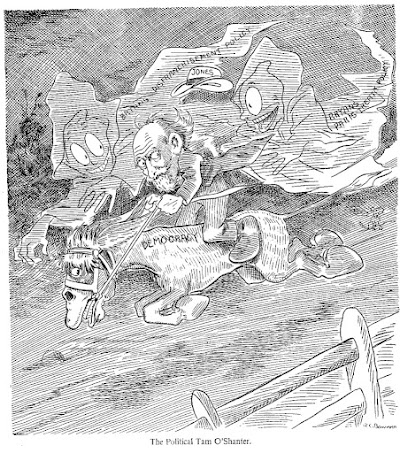 |
| Rowland C. Bowman cartoon on page 28 |
I've featured cartoons from the book in this blog several times (During Filipino-American History Month, I always see a spike in views of the post with his cartoons about U.S. occupation of the Philippines), and I'm sorry to say that this 121-year-old book is worse for wear than when my aunt left it to me in 1989. It no longer has a spine, and the back cover split in half a few years ago. For the sake of what remains of the front cover and the pages inside, the book belongs in the climate-controlled safety of the Ireland's vault, not the bookshelf in my basement.
Bowman, who died in 1903 at the age of 32, never won any national awards. But at least his book is in hallowed company now.















